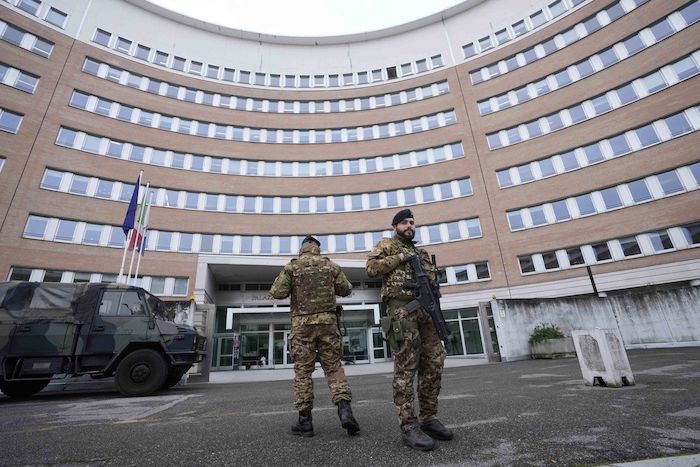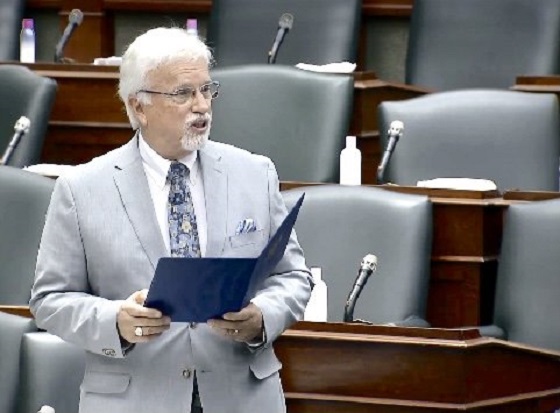Crime
Italy court weighs handover in EU Parliament corruption case

By Colleen Barry And Lorne Cook in Brescia
BRESCIA, Italy (AP) — An Italian court on Monday was deciding whether to hand over to Belgium a suspect in a big corruption scandal at the European Parliament, in which Belgian prosecutors suspect the wife and daughter of a former lawmaker of being part of a criminal gang trying to influence EU legislators on behalf of Qatar and Morocco.
According to arrest warrants seen Monday by The Associated Press, former EU lawmaker Pier Antonio Panzeri and three other suspects were charged on Dec. 9 with corruption, participation in a criminal group and money laundering. Belgian prosecutors suspect that they “were paid large sums of money or offered substantial gifts to influence parliament’s decisions.”
The investigation of allegations of cash and gifts for political influence corruption is one of the biggest to hit the European Parliament. Lawmakers last week suspended work on Qatar-related files and vowed to toughen lobbying laws. Qatar vehemently denies that it is involved.
According to the two European arrest warrants issued by Belgian judge Michel Claise, Panzeri is “suspected of intervening politically with members working at the European Parliament for the benefit of Qatar and Morocco, against payment.”
Panzeri’s wife, Maria Dolores Colleoni, and their daughter, Silvia Panzeri, are suspected of being “fully aware” of his activities and even to help transport “gifts” given by Morocco’s ambassador to Poland, Abderrahim Atmoun.
Prosecutors in Belgium are seeking their transfer to Belgium to face the same charges as the other four suspects, who include a former EU parliament vice president and her Italian partner. They face up to five years in prison if found guilty, according to the warrants.
A hearing was under way Monday in Brescia on whether to hand over Colleoni, while her daughter’s case will be heard separately on Tuesday. They are both under house arrest near Brescia, though Colleoni was in court on Monday. Panzeri himself is detained in Belgium.
Colleoni’s lawyer, Angelo de Riso, said handing her to Belgian authorities would violate her human rights because an Italian court has already conceded house arrest and a transfer to Belgium would land her in jail pending charges and trial.
A former vice president of the European Parliament, Eva Kaili, remains in custody in Belgium awaiting a hearing on Thursday. Her term in office was terminated by EU lawmakers last week. Her partner, Francesco Giorgi, was a parliamentary advisor.
Besides Panzeri, who leads the Fight Impunity campaign group, Niccolo Figa-Talamanca, secretary-general of the non-governmental organization No Peace Without Justice, was also charged. He has been released from prison but remains under surveillance and must wear an electronic monitoring bracelet.
Separately Monday, the former head of the Italian parliamentary committee on intelligence on Monday told reporters that a report on Qatar had been prepared and unanimously approved in August. The report has been classified and sealed, according to Adolfo Urso, now a minister in Premier Giorgia Meloni’s government. The report also includes China and Russia.
___
Cook reported from Brussels.
Addictions
British Columbia to re-criminalize hard drug use in public after massive policy failure

From LifeSiteNews
British Columbia premier David Eby announced that his province plans to re-criminalize hard drug use in public spaces after its decriminalization last year led to widespread social disorder.
British Columbia is asking the Trudeau government to roll back its drug decriminalization program after increased violence and continued overdoses.
On April 26, New Democratic Party (NDP) premier of British Columbia David Eby announced that he is working with Prime Minster Justin Trudeau’s federal government to re-criminalize drug use in public spaces, including inside hospitals, on transit, and in parks. British Columbia, under permission from the Trudeau government, had decriminalized such behavior in 2023.
“Keeping people safe is our highest priority,” Eby explained in a press release. “While we are caring and compassionate for those struggling with addiction, we do not accept street disorder that makes communities feel unsafe.”
“We’re taking action to make sure police have the tools they need to ensure safe and comfortable communities for everyone as we expand treatment options so people can stay alive and get better,” he continued.
Under the new regulations, police would be given the power to prevent drug use in all public places, including hospitals, restaurants, transit, parks and beaches.
However, drug use would remain legal at “a private residence or place where someone is legally sheltering, or at overdose prevention sites and drug checking locations.”
Eby’s concerns over drug use were echoed by Minister of Public Safety and Solicitor General Mike Farnworth who said, “Our communities are facing big challenges. People are dying from deadly street drugs, and we see the issues with public use and disorder on our streets.”
“As we continue to go after the gangs and organized criminals who are making and trafficking toxic drugs, we’re taking action now to make it illegal to use drugs in public spaces, and to expand access to treatment to help people who need it most,” he promised.
Beginning in early 2023, Trudeau’s federal policy, in effect, decriminalized hard drugs on a trial-run basis in British Columbia.
Under the policy, the federal government began allowing people within the province to possess up to 2.5 grams of hard drugs without criminal penalty, but selling drugs remained a crime.
While British Columbia has not yet indicated it plans to re-criminalize possession, its decision to clamp down on public drug use presents a major departure from its previous tactics of continually liberalizing its attitude toward narcotic use.
Since being implemented, the province’s drug policy has been widely criticized, especially after it was found that the province broke three different drug-related overdose records in the first month the new law was in effect.
The effects of decriminalizing hard drugs in various parts of Canada has been exposed in Aaron Gunn’s recent documentary, Canada is Dying, and in U.K. Telegraph journalist Steven Edginton’s mini-documentary, Canada’s Woke Nightmare: A Warning to the West.
Gunn says he documents the “general societal chaos and explosion of drug use in every major Canadian city.”
“Overdose deaths are up 1,000 percent in the last 10 years,” he said in his film, adding that “[e]very day in Vancouver four people are randomly attacked.”
Alberta
Three Calgary massage parlours linked to human trafficking investigation

News release from the Alberta Law Enforcement Response Team (ALERT)
ALERT’s Human Trafficking unit has searched and closed three Calgary massage parlours. A year-long investigation has linked the businesses and its owner to suspected human trafficking.
ALERT arrested Hai (Anna) Yan Ye on April 16, 2024 and charged the 48-year-old with advertising sexual services, drug offences and firearms offences. The investigation remains ongoing and further charges are being contemplated.
Ye was linked to three commercial properties and two homes that were allegedly being used for illegal sexual activities and services. The massage parlours were closed following search warrant executions carried out by ALERT, the Calgary Police Service, and the RCMP:
- Seagull Massage at 1034 8 Avenue SW;
- 128 Massage at 1935 37 Street SW; and
- The One Massage Centre at 1919 31 Street SE.
- 1100-block of Hidden Valley Drive; and
- 3100-block of 12 Avenue SW.
As result of the search warrants, ALERT also seized:
- $15,000 in suspected proceeds of crime;
- Shotgun with ammunition; and
- Various amounts of drugs.
“We believe that these were immigrants being exploited into the sex trade. This has been a common trend that takes advantage of their unfamiliarity and vulnerability,” said Staff Sergeant Gord MacDonald, ALERT Human Trafficking.
Four suspected victims were identified and provided resources by ALERT’s Safety Network Coordinators.
ALERT’s investigation dates back to February 2023 when a tip was received about suspicious activity taking place at the since-closed Moonlight Massage. That location was closed during the investigation, in December 2023, when the landlord identified illegal suites on the premises.
The investigation involved the close cooperation with City of Calgary Emergency Management and Community Safety, Alberta’s Safer Communities and Neighbourhoods (SCAN) team, Canada Border Services Agency (CBSA), and the RCMP.
Ye was released from custody on a number of court-imposed conditions.
Anyone with information about this investigation, or any case involving suspected human trafficking offences, is asked to call Crime Stoppers at 1-800-222-TIPS (8477) or the Calgary Police Service non-emergency line at 403-266-1234.
ALERT was established and is funded by the Alberta Government and is a compilation of the province’s most sophisticated law enforcement resources committed to tackling serious and organized crime.
-

 Alberta1 day ago
Alberta1 day agoAlberta’s vision for passenger rail
-

 COVID-192 days ago
COVID-192 days agoFormer Canadian lawmaker has no regrets about refusing COVID shot despite losing his job
-

 COVID-192 days ago
COVID-192 days agoPeckford: Hallelujah! Supreme Court of Canada to hear Newfoundland and Labrador charter case
-

 Alberta1 day ago
Alberta1 day agoThree Calgary massage parlours linked to human trafficking investigation
-

 Uncategorized1 day ago
Uncategorized1 day agoMaking Alberta a geothermal energy leader
-

 Alberta2 days ago
Alberta2 days agoCanada’s postal service refuses to help with Trudeau’s gun ban buyback program: report
-

 conflict21 hours ago
conflict21 hours agoColumbia on Lockdown After pro-Palestinian Protesters Take Over Building, Hold Janitors Hostage
-

 Canadian Energy Centre21 hours ago
Canadian Energy Centre21 hours agoNorth America LNG project cost competitiveness








